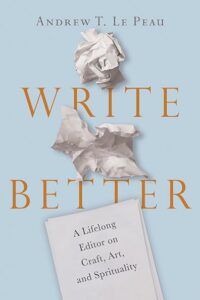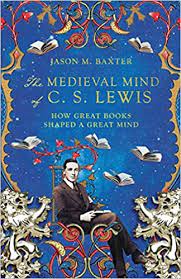Many books on writing nonfiction advocate a clean style stripped of unnecessary words and ornate language—mine included! In Write Better I note, “Hemingway pioneered unadorned fiction a century ago. Orwell, Strunk & White, and Zinsser then took up the cause for nonfiction. And happily this approach still holds sway” (160). They rightly complain about the clutter of obscure or officious writing that hides what is being said rather than illuminates it.
 But then I add this thought: “Art goes through phases, and I suppose there will come a time when spare prose will fall out of favor and something different will replace it” (161). What might that style look like?
But then I add this thought: “Art goes through phases, and I suppose there will come a time when spare prose will fall out of favor and something different will replace it” (161). What might that style look like?
I don’t know. But sometimes the past can give us hints about the future. The Medieval world might, for example, suggest how and why different styles rise and fall. For people in that era, the cosmos was a thing of intricate beauty, ornately crafted by the Master Artisan who wove spiritual realities into his creation. No wonder their very prose and poetic styles reflected this worldview.
And no wonder Hemingway shunned such a style. His world (and ours) is stripped bare of all but what can be seen and touched, measured and analyzed. We live in a complex, intricate universe—yes. But one of lifeless particles guided by the impersonal forces of gravity, electromagnetism, and subatomic energy. Even in our imagination so-called spiritual powers are generated by the material (think the Force of Star Wars) not the other way around.
This flattened perspective nonetheless seeks to fill the gap left by a world without wonder. So often we are beholden to the spell it weaves. As Lewis said eighty years ago, “You and I have need of the strongest spell that can be found to wake us from the evil enchantment of worldliness which has been laid upon us for nearly a hundred years.”*
We need new stories and new ideas to break this enchantment, to be sure. But perhaps we also need a new style of writing, a style that itself reflects a universe populated not merely with quarks and quasars, bosons and black holes but also one infused with mystery and meaning, beauty and blessing.
 Lewis especially admired how Dante achieved this. He showed “how an artist could cast a ‘counterspell’ in which the good feels weighty and attractive, a spell to overcome the ‘evil enchantment’ cast by modernity.” In Paradiso, instead of picturing an insubstantial existence of clouds and harps, “Dante’s poetry gets more concrete, more sensible, more tangible, with every step closer toward God.” The poet adds another dimension as well. “Dante simultaneously combines ‘weight’ and ‘soaring,’ and thus paradoxically renders sensible that which is beyond language.”**
Lewis especially admired how Dante achieved this. He showed “how an artist could cast a ‘counterspell’ in which the good feels weighty and attractive, a spell to overcome the ‘evil enchantment’ cast by modernity.” In Paradiso, instead of picturing an insubstantial existence of clouds and harps, “Dante’s poetry gets more concrete, more sensible, more tangible, with every step closer toward God.” The poet adds another dimension as well. “Dante simultaneously combines ‘weight’ and ‘soaring,’ and thus paradoxically renders sensible that which is beyond language.”**
We can more readily imagine how this might be played out in fiction (as Lewis himself did in The Great Divorce). But what kind of writing style might reflect this re-enchanted world? I don’t think it will or should simply go back to mimic Medieval patterns. We have to move forward in ways that are mindful of the world we have now. If you know of examples to suggest that might achieve this, I’d welcome them.
Style in writing matters. Not only do the ideas we employ communicate meaning and substance, but so does the way in which we write.
—
*C. S. Lewis, “The Weight of Glory,” The Weight of Glory: And Other Addresses (New York: HarperOne, 1980), 31.
** Jason M. Baxter, The Medieval Mind of C. S. Lewis (Downers Grove, IL: IVP Academic, 2022), 88, 91, 95.

I have wondered the same thing. I’m a technical writer by trade (though it’s not my passion), so I’ve become very skilled at writing plain, spare prose. And … I hate it. I go to the poets of a few hundred years back whenever I can. I’m not a fan of wasteful “purple prose,” but I don’t believe our current style is adequate for so many things. (It’s fine for most technical writing, but there is more to life than that!)
I’ve often compared poetry to technical writing, though–in either case, if the writing is good and the author communicates what he or she set out to communicate, then every word used is necessary, and there are no unnecessary words. That doesn’t mean everything needs to be short and spare. If something in poetry seems unnecessarily wordy, for instance, it’s possible that the poet wrote it that way for a reason that lies beyond what we see at first glance. (Which is the point you made above with Dante.) Of course, you can see this happen in good prose as well.
I really enjoyed reading your short article here, as this is a topic I’ve thought often about!
I think you are right on target, Nina. Poetry is intensely compact. Long, epic poems like Dante’s trilogy can fool us into thinking otherwise. I know technical writing can be a grind. But I imagine you have at times taken pride even in wielding that craft well. I hope so. Andy
Hullo!
I just listened to the Habit podcast, where you and Jonathan Rogers talked about the idea of “contributing to existing tradition.” I love that and will be thinking about it for a while.
As to your question here about writers who strike a good balance of style and accessibility, a few favorite memoirists come to mind: Carolyn Weber (Surprised by Oxford, Sex and the City of God), Sarah Bessey (Miracles and Other Reasonable Things), and Frederick Buechner (Beyond Words, Wishful Thinking, and Whistling in the Dark). Each one has a simple yet poetic way of writing that I admire. It reminds me that writing is both a craft and an art form, not just a method for communicating ideas. I love it when Buechner says something simple in a way that stands out like a bright shining gem you can pluck and put in your back pocket. Those are the books I remember and carry with me.
Thanks for your own thoughtful writing!
Hi Bailey. These are excellent suggestions of writers who are clear yet show poetic sensibilities in their prose. You might be on to something! Andy
Two things. 1) I did not know you were a guest on the habit podcast. I will listen to it soon. I would recommend a recent edition of that same podcast featuring Allen Levi.
2) I just gave a copy of Allen Levi’s book to my friend Mark Malan. It turns out we share Mark as a mutual friend. I mentioned your blog to Mark and Judy over Tea and they send their greetings to you and your family. I am just finishing Dreyer’s English and am mesmerized by it. I’ll be jumping into your book in a matter of days and am looking ahead to it.
Hi, Dave. Thanks for the two items. My fond greetings back to Judy and Mark. And I’m glad you are enjoying Dreyer. It is fabulous. I’ll also check out Allen Levi on Habit. Thanks for the tip. Andy